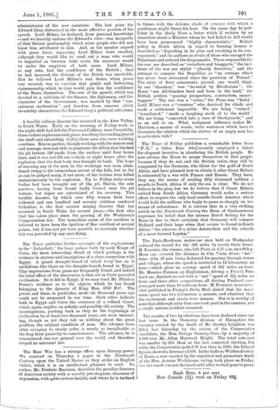The Boer War has a strange effect upon literary power.
We received on Thursday a paper in the Nineteenth Century upon the United States as they strike an English visitor, which it is an intellectual pleasure to read. Its author, Mr. Frederic Harrison, describes the peculiar features of American society with a careful, yet eloquent, clearness of expression, with quite curious insight, and where he is inclined to blame, with the delicate shade of censure with which a gentleman might blame his host. On the same day he pub- lishes in the Daily News a letter which if written by an Anarchist about a Minister whom he had failed to kill would have been pronounced "highly characteristic." British policy in South Africa in regard to burning houses is described as "degrading in its plan and revolting in its con- sequences," and its authors as rivals of those who ravaged the Palatinate and ordered the dragonnades. Those responsible for the war are described as "swindlers and braggarts," the inci- dents of the war are styled "ghastly ferocities," and the attempt to conquer the Republics as "an outrage which has never been attempted since the partition of Poland." The story of Boer armaments, proved, one would think. by our "disasters," was "invented by Rhodesians " ; the Boers "are Afrikanders bred and born in the land," the British settlers "passing prospectors, contractors, carpet- baggers." The war was a "crime," the Press was "hired," Lord Milner was a " creature " who deceived his chiefs and made a settlement impossible. We are being "ruined." "humiliated," "made a laughing stock of to the world." We are being "converted into a race of blackguards," and BO on and so on_ What malignant influence makes Mr Harrison, a master of words, write sentences which have to literature the relation which the stutter of an angry man has to articulate talk ?






































 Previous page
Previous page